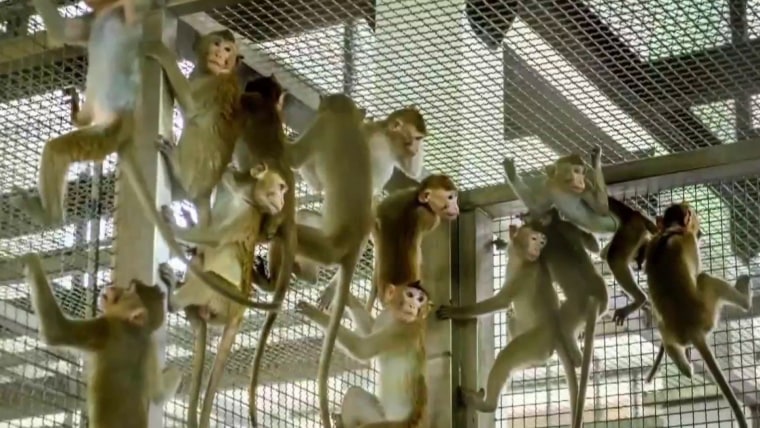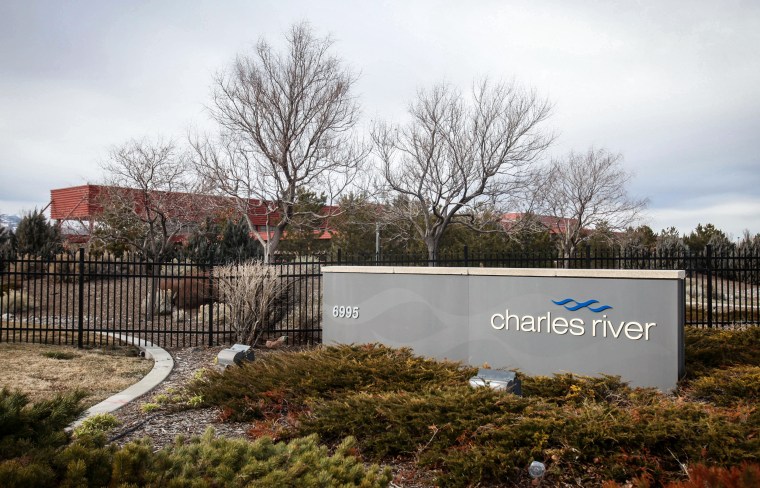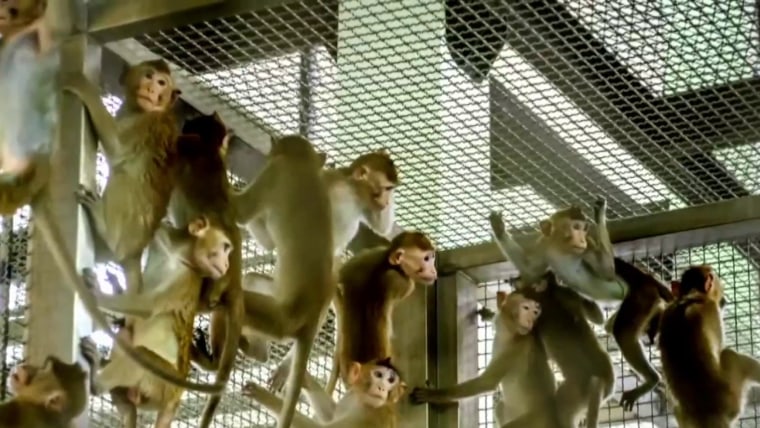
[ad_1]
Federal wildlife officers discovered themselves in a difficult scenario after they flagged current shipments of analysis monkeys as improperly imported into the U.S.
The greater than 1,000 long-tailed macaques had been imported by Charles River Laboratories, a analysis firm based mostly in Massachusetts. Since being flagged by wildlife officers, the monkeys have been below the corporate’s care, a Charles River spokesperson stated.
Over the previous six months, officers with the U.S. Fish and Wildlife Service have contacted no less than two animal sanctuaries to inquire about the price of housing and feeding the primates for the remainder of their lives.
One sanctuary quoted a price ticket of $125 million — to cowl staffing prices, the acquisition of land and constructing infrastructure — earlier than communication with authorities officers stalled final week.
The federal authorities then determined to ship the monkeys again to Cambodia, in keeping with PETA, however the animal rights teams are combating again.
“We all know that the monkeys should not going to be secure on the different finish,” stated Liz Tyson, applications director at Born Free USA, the group that supplied the $125 million quote to wildlife officers.
PETA Senior Vice President Kathy Guillermo stated the group is urging Fish and Wildlife to “do the suitable factor and ship these light beings to worthy, keen sanctuaries.”
It’s not clear what prompted Fish and Wildlife to dam Charles River from utilizing the monkeys. An company spokesperson stated the monkey shipments had been refused clearance because of an ongoing investigation however didn't present extra particulars.
The importation of monkeys utilized in medical analysis is strictly regulated, requiring paperwork that attests that the primates have come from breeding services.
The Justice Division has for years been investigating whether or not American firms, together with Charles River, had been concerned within the smuggling of monkeys poached from the wild and delivered to the U.S. with falsified paperwork.

A spokesperson for Charles River acknowledged that “various shipments” from the corporate’s Cambodian provider had been just lately denied clearance by the Fish and Wildlife Service.
“We've operated below the idea that every one shipments of [monkeys] … glad the fabric necessities, documentation and associated processes and procedures of CITES,” a 1975 treaty designed to make sure that the worldwide marketplace for sure vegetation and animals doesn’t threaten their survival within the wild.
The corporate stated it has voluntarily suspended future shipments of Cambodian monkeys “till such time we and the U.S. Fish and Wildlife Service can develop and implement new procedures to strengthen confidence that the [monkeys] we import from Cambodia are purpose-bred.”
The corporate added that it “continues to look after” the Cambodia-sourced monkeys, but it surely didn't specify the situation.
Charles River introduced in February that it had been subpoenaed within the Justice Division probe.
“We're totally cooperating with the U.S. authorities as a part of their investigation and consider that any issues raised with respect to Charles River are with out advantage,” the corporate stated in an announcement on the time.
Angela Grimes, the chief government of Born Free USA, stated the group was first contacted by Fish and Wildlife in September. The brokers had been on the lookout for a house for 360 monkeys.
Fish and Wildlife officers known as again in February and stated the variety of monkeys had ballooned to 1,200, Grimes stated.
“There’s no place with house for 1,200 monkeys,” Grimes added. “The federal government was battling that. We had been additionally battling that.”
Grimes stated she hoped to work with the federal authorities to give you a plan to rearrange for the required funding to arrange housing for the monkeys. However then she felt just like the rug had been pulled out from below her when PETA introduced it had data suggesting that the federal government deliberate to ship the monkeys again to Cambodia.
“We weren't given the complete alternative to have interaction in a critical dialog to give you options that might work,” Grimes stated.
Krystal Mathis, government director of Primarily Primates, a sanctuary exterior of San Antonio, stated she acquired a name from Fish and Wildlife in February.
“It gave the impression of they [the agents] had been looking for out what all their choices had been,” Mathis stated. “We stated we may undoubtedly take a number of the females to start out, and possibly extra as we realized extra data.”
Primarily Primates and Born Free USA each stated a brand new construction for housing a dozen rescued monkeys can run greater than $100,000. The animals additionally want day by day feeding and frequent veterinary care requiring employees and sources.
On Monday PETA supporters flooded the Fish and Wildlife Service with hundreds of emails and telephone calls urging the company to not ship the monkeys again to Cambodia, the group stated.
The Fish and Wildlife Service spokesperson declined to offer any details about its plans for the monkeys.
"Disposition of shipments which might be refused clearance varies based mostly on circumstances, and we're unable to remark additional on these shipments right now," the spokesperson stated.
In November, two Cambodian wildlife officers had been amongst eight individuals charged with operating a world monkey smuggling ring that allegedly shipped primates to the U.S. that had been poached from the wild and falsely labeled as coming from breeding services.
The smuggling of monkeys caught within the wild is believed to have been happening for many years as a result of colossal demand for laboratory monkeys within the U.S. and the restricted provide at breeding services at residence and overseas.
NBC Information reported in December that the Covid pandemic and race to discover a vaccine squeezed the market even additional, setting off a mad scramble for the animals that fueled a spike in monkey poaching and contributed to the endangerment of the species mostly utilized in drug research — the long-tailed macaque.
“It’s gotten out of hand,” Malene Friis Hansen, the director of the Lengthy-tailed Macaque Challenge, a Denmark-based nonprofit group centered on conserving the primates, stated on the time.
[ad_2]
Supply hyperlink
https://classifiedsmarketing.com/today-news/the-fate-of-1000-research-monkeys-is-unclear-after-government-intervention/?feed_id=73415&_unique_id=6413baa73d31d
